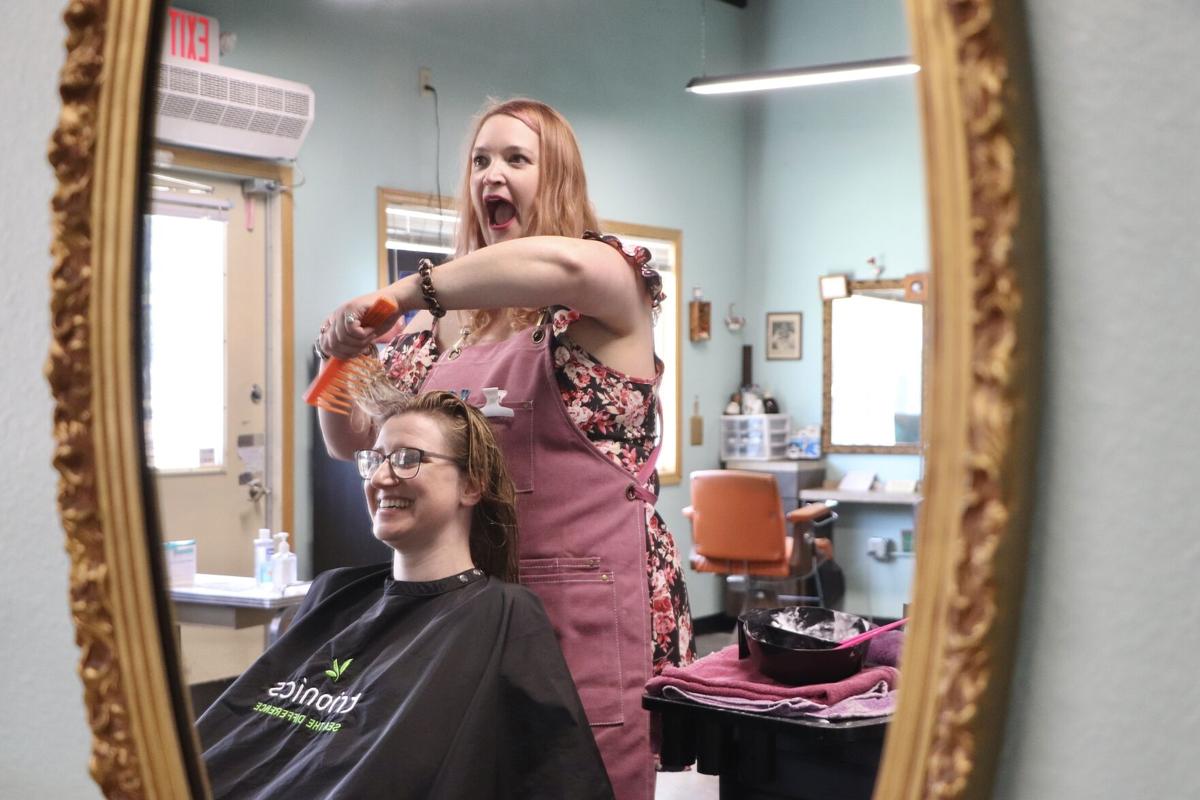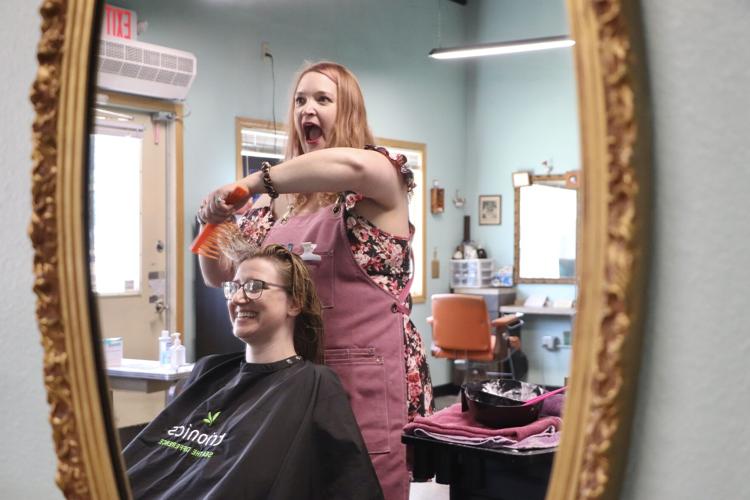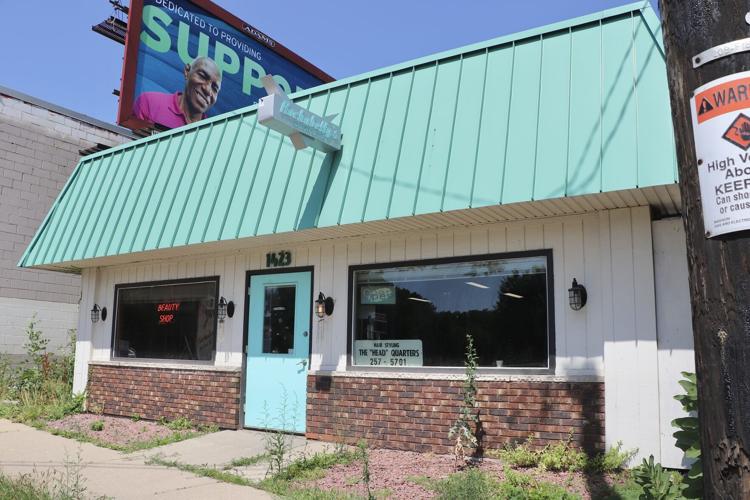After more than a decade of operating as a hair salon and spa at various locations on Madison’s South Park Street, Rockabetty’s is closing.
Brooklyn Barn opened in the village of Brooklyn in the fall of 2022, amid a retail renaissance happening in the small town.
Angela Shulz, owner and stylist at Rockabetty’s and the salon’s only remaining full-time employee besides its cleaner, said she views the closure as bittersweet and a potential reliever of financial and mental stress. She’s selling the Rockabetty’s building to open her own home hair styling studio.
At one point, Rockabetty’s had eight full-time employees. But now it’s difficult to attract and retain hairstylists, massage therapists, aestheticians and nail technicians. And while Shulz has retained most of her clients, some have spaced their appointments to save money.
That has left Shulz with a mortgage she can’t afford.
“I think we were paying closer to $2,500 a month and now it’s $2,800 a month,” Shulz said. “The interest (mortgage) rate is 11.5% and has gone up 4 times in the last few months.”
People are also reading…
With her home studio, which is under construction, she’ll be able to triple her income, she said. Shulz also runs a mobile hair and makeup service for weddings and rents out parts of her house on AirBnb.
She’s not alone in her challenges. Other salons and spas across Madison say that attracting staff, increasing commercial rents and rising interest rates are challenges they face as they try to provide services to their customers.
That could have to do with workers in service industries gravitating toward jobs that were more stable during the COVID-19 pandemic, said Nancy Wong, UW-Madison professor of consumer science.
“Perhaps these industries also do not pay as well,” she said, and salon owners are faced with the expense of raising wages and offering regular hours. That cost can be passed on to customers.
There’s also long lead times in becoming a certified stylist, aesthetician or massage therapist, Wong said, and the cost of attending beauty school has risen.
Aveda Institute Madison’s tuition for its cosmetology or hairstyling program is roughly $20,000, for instance, according to its website. When Schulz went to school in the ’90s, she recalls a much cheaper ride through school.
Wong said that the pandemic has also encouraged more do-it-yourself activity among consumers. Rather than turning to an aesthetician to get their makeup done, they choose a YouTube tutorial instead. Such consumer behavior could be affecting haircuts, facials and even massage.
“I think (these issues) will resolve as the market resolves,” Wong said. “These disruptions are going to take some time to play out.”

The owner of Rockabetty's, on South Park Street, said the interest rate on her mortgage has increased four times in recent months.
‘We are not at full swing yet’
Autumn Burns, stylist, owner and manager at The Spa At Autumn Organics in Sun Prairie, said her business has 22 employees, including four full-time hair stylists and two full-time massage therapists. She would like a few more. The spa opened in 2010.
While she said business at the Sun Prairie spa is nearly back to normal, Burns spoke of her rent increasing from a total of $4,200 — the business takes up two floors — to $7,100.
Burns said her landlord greatly supported her during the throes of the pandemic, but she has had to raise prices on retail products.
What has helped the spa, Burns said, is its niche market of services in which organic and clean products are used. A lot of the business’s clients are cancer patients and people who deal with chronic pain conditions.
At Nogginz on State Street, owner and barber Koby Foytick said “we are not at full swing yet” in sales and growth compared with pre-COVID years.
Nogginz has eight full-time employees, including hairstylists and barbers. Foytik would like to hire a few more, he said. The salon has been on State Street since 2002 and caters mostly to UW-Madison students.
Photos: Art Fair on the Square

Jennifer Akese-Burney, of Crystal Lake, Illinois, with Akese Stylelines, helps a customer try on clothing she makes using fabric from Ghana, where she is from, during Art Fair on the Square in Madison, Wis., Saturday, July 8, 2023. AMBER ARNOLD, STATE JOURNAL

A visitor gets a close look at art by Brad and Sundie Ruppert, from Iowa, who use the remnants of the brim from making felt hats to create their art, at their booth during the Art Fair on the Square in Madison, Wis., Saturday, July 8, 2023. AMBER ARNOLD, STATE JOURNAL

Kate Bowers, of Madison, and her son, Liam, 5, check out a sculpture by Andrew Carson from Seattle. Carson is one of 425 artists whose work is on display and being sold over the weekend at Art Fair on the Square.

Art Fair on the Square attendees stop to check out work by Greta Sandquist, of St. Paul, Minn. Sandquist has been interested in art since childhood, but didn't start selling her paintings until 2011.

Norman Morgan, of Huntsville, Alabama, works on a bracelet using a metalworking technique called repoussé at his booth during Art Fair on the Square in Madison, Wis., Saturday, July 8, 2023. AMBER ARNOLD, STATE JOURNAL

Jonathan Rose, with Hands on Fire from Tullahoma, Tennessee, plays one of his steel tongue drums, made from old propane tanks, at his booth during Art Fair on the Square in Madison, Wis., Saturday, July 8, 2023. AMBER ARNOLD, STATE JOURNAL

(From left) Chris and Russ Melland, from Stoughton, check out sculptures that are made using recycled material by Joseph and Bridget Farmer, with Cultivated Art by JB Farmer out of St. Charles, Missouri, during Art Fair on the Square in Madison, Wis., Saturday, July 8, 2023. AMBER ARNOLD, STATE JOURNAL

Visitors check out Chris Cumbie’s booth during Art Fair on the Square in Madison, Wis., Saturday, July 8, 2023. AMBER ARNOLD, STATE JOURNAL

Jessica Christenson, of Madison, and her niece, Amelia Greig, 7, front, from Springfield, Illinois, check out photography by Nicole Houff, of Minneapolis, Minnesota, during Art Fair on the Square in Madison, Wis., Saturday, July 8, 2023. AMBER ARNOLD, STATE JOURNAL

Visitors stop by the Corrie Art Glass both by artists Chris and Lynn Corrie, from Monticello, Illinois, during Art Fair on the Square in Madison, Wis., Saturday, July 8, 2023. AMBER ARNOLD, STATE JOURNAL

Artist Kwame Boama Mensa-Aborampa, left, from Bolingbrook, Illinois, talks to passersby outside his booth with his daughter, Yaa Krobia-Asantewaa, 9, at right, during the Art Fair on the Square in Madison, Wis., Saturday, July 8, 2023. AMBER ARNOLD, STATE JOURNAL

A portion of the crowd at the Art Fair on the Square Saturday. MMOCA officials estimated that the weekend event would draw around 200,000 people to the Isthmus.

Visitors look at artwork by Alla Tsank. While the number of artists has remained consistent each year, MMOCA spokesperson Marni McEntee says the number of visitors to Art Fair on the Square has grown following the lifting of COVID-19 pandemic restrictions.

Jeanne Akita talks to a passerby at her Illusions Lab fiber and felting art booth during Art Fair on the Square in Madison, Wis., Saturday, July 8, 2023. AMBER ARNOLD, STATE JOURNAL
“I think we were paying closer to $2,500 a month and now it’s $2,800 a month. The interest (mortgage) rate is 11.5% and has gone up 4 times in the last few months.”
Angela Shulz, owner of Rockabetty's





























